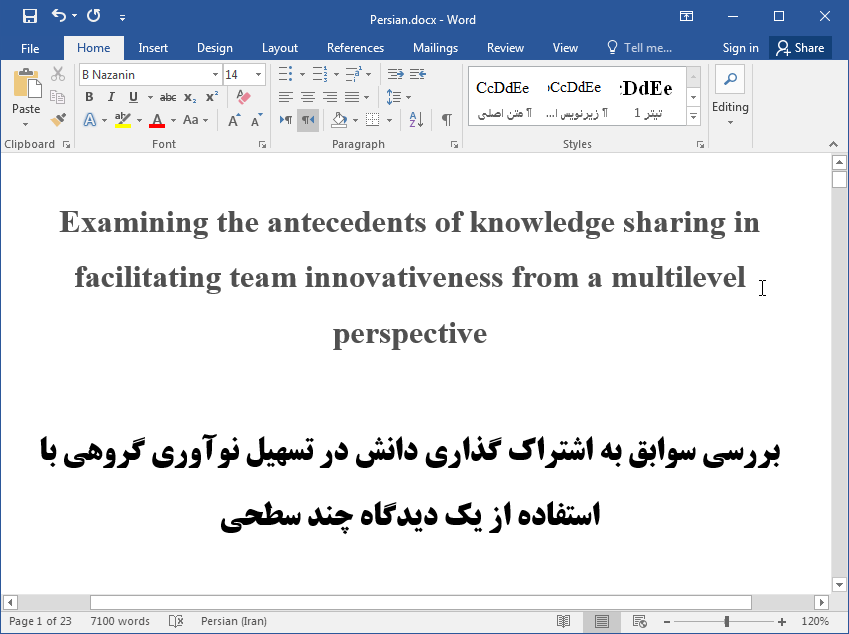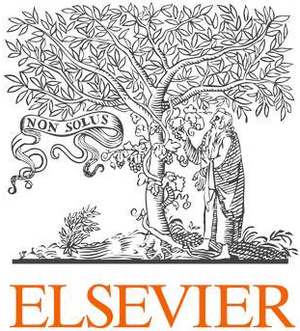اشتراک گذاری دانش در کمک به نوآوری گروهی از یک دیدگاه چند سطحی


19,500 تومانشناسه فایل: 8334
- حجم فایل ورد: 272.3KB حجم پیدیاف: 160.1KB
- فرمت: فایل Word قابل ویرایش و پرینت (DOCx)
- تعداد صفحات فارسی: 23 انگلیسی: 9
- دانشگاه:
- Institute of Technology Management ,Tsing Hua University, 101, Section 2, Kuang-Fu Road, Hsinchu 30013, Taiwan
- C.T. Bauer College of Business, University of Houston, 334 Melcher Hall, Houston, TX 77204-6021, United States
- ژورنال: International Journal of Information Management (2)
چکیده
در این مقاله به بررسی چگونگی جو رهبری تحول گرا (TFL) بر اتحاد و یکپارچگی اعضا یا کارکنان گروه و بر اهداف آن ها برای به اشتراک گذاشتن دانش با یکدیگر تاثیر داشته و چطور این انگیزه ها بر نوآوری گروهی اثر گذار است. داده ها از 301 کارمند که شامل 52 گروه تحقیق و توسعه (R&D) جمع آوری شد. فرضیه ها با هر دو مدل سازی خطی سلسله مراتبی (HLM) و تجزیه و تحلیل رگرسیون مورد آزمایش قرار گرفتند. نتایج نشان داد که انگیزه کارکنان برای به اشتراک گذاشتن دانش در میان اتحاد گروهی با TFL ارتباط داشت. در سطح گروه، نتایج روابط میان انگیزه به اشتراک گذاری دانش در گروه و نوآوری گروهی را تایید کرد. نتایج همچنین نشان داد که (انگیزه به اشتراک گذاری دانش در گروه، ارتباط میان TFL و نوآوری گروهی را به ارمغان می آورد.
مقدمه مقاله
نوآوری، انعطاف پذیری و داشتن تمایل برای پذیرش روش های جدید به جهت خلق راه حل های دانش بنیان، به طور روزافزون به عنوان یکی از ابزارهای ضروری و لازم الاجرا در اختیار شرکت هایی قرار دارد که قصد دارند تا از عهده پیچیدگی محیط های رقابتی امروزی به خوبی برآیند. هر چقدر که بخش های بیشتری از اقتصاد جهانی دانش بنیان می گردد، اهمیت درک روابط منطقی میان سرمایه اجتماعی یک سازمان و ساز و کارهای مدیریت دانش که به وسیله سازمان بکار گرفته می شود و همچنین اثرات آن بر خلاقیت و نوآوری، هم در سطح گروهی و هم انفرادی بیشتر می شود (Nahapiet & Ghoshal, 1998; Yli-Renko, Autio, & Sapienza, 2001). در حالی که چند تن از محققان و وکلا اذعان داشتند که به اشتراک گذاری دانش نقش مهمی در ایجاد و نگهداری کارایی و سودمندی پایدار ایفا می کند (e.g. Alavi & Leidner, 2001; Kogut & Zander, 1996; Spender & Grant, 1996; Tsai, 2001)، در این مقاله به طور شگفت آوری تعداد اندکی از مطالعات تجربی به طور پیوسته هم بر روی سوابق به اشتراک گذاری دانش و هم بر روابط شان با نوآوری سازمانی مورد بررسی قرار گرفت.
در یک سطح سازمانی، مقالات و نوشتههای موجود بر اثرات شیوههای مدیریتی و فرهنگ سازمانی به اشتراک گذاری دانش تاکید دارند. تحقیقات پیشین با بیش از یک چشم انداز عضو گروهی انفرادی (e.g., Bartol & Srivastava, 2002; Chen & Huang, 2007; Floyd & Lane, 2000). در مقایسه با تمرکز بر روی شخصیتها و گرایشهای کارکنان و روابط آنها با به اشتراک گذاری دانش (Cabrera, Collins, & Salgado, 2006; Mooradian, Renzl, & Matzler, 2006; Szulanski, 1996; Yang & Farn, 2009). با وجود اینکه که هر یک از این دو جریان تحقیقاتی اطلاعات سودمند و مفیدی را ارائه داده است، توجه بسیار اندکی از یک دیدگاه چند سطحی به سوابق و پیامدهای به اشتراک گذاری دانش داشته است، علی رغم اینکه اهمیت اتخاذ یک چشم انداز تحلیلی و مفهومی هم سطح بر تعاملات اجتماعی تایید شده که شامل به اشتراک گذاری دانش در محیطهای سازمانی میشود (Brass, Galaskiewicz, Greve, & Tsai, 2004; Siemsen, Balasubramanian, & Roth, 2007). هدف از بررسی و تحقیق حاضر این بود که به ارائه این دیدگاه چند سطحی روی یک موضوع کمک بشود تا این که بهترین رویکرد ممکن هم به لحاظ نظری و هم عملی اتخاذ شود. سوال اساسی که ما در این بررسی مطرح میکنیم این است که آیا یک جو رهبری تحول گرا (TFL) میتواند به نوآوری گروهی کمک کند. اگرچه بررسیها بهطور مکرر بر روی تاثیرات رهبری گروهها صورت گرفته است، بخش مهمی از تحقیقات پیشین در یک چارچوب تحلیلی تک سطحی انجام شده که متاسفانه بررسیهای یک سطح در یک زمان از شناخت روابط شامل محاسبهگرها در دو یا چند سطح و همچنین یک نتیجه در یک سطح تک جلوگیری میکند (Kozlowski & Klein, 2000)، بنابراین ما در این بررسی یک رویکرد چند سطحی ارائه کردیم تا مدل پیشنهادی مان را بیازماییم.

ما معتقدیم که بررسی حاضر همکاری و پیوند مهمی میان رهبری، نوآوری و دانش ایجاد خواهد کرد که این هدف به واسطه ارائه جامعتری از تحلیل چند سطحی چندین متغیر اساسی و بهطور بالقوه با اهمیت میسر خواهد بود. بهطور مشخص همانگونه که در شکل 1 نشان داده شده است. ما از طریق مدل سازی خطی چند مرتبهای بررسی کردیم که آیا جو رهبری تحول گرا (TFL) به واسطه ادراکات گروهی بر انگیزه به اشتراک گذاری دانش اعضای گروه تاثیر میگذارد (HLM; Raudenbush & Bryk, 2002)، و ثانیاً آیا این انگیزههای تقویت شده میتواند رابطه بین جو رهبری و نوآوری گروهی را توضیح دهند.
ABSTRACT Examining the antecedents of knowledge sharing in facilitating team innovativeness from a multilevel perspective
This paper examines how transformational leadership (TFL) climate influences employees’ team identity and their intentions to share knowledge and how team knowledge sharing intention subsequently influences team innovativeness. Data was collected from 301 employees comprising 52 R&D teams. Hypotheses were tested with both hierarchical linear modeling (HLM) and regression analyses. Results indicated that TFL climate was related to employees’ intention to share knowledge through team identity. At the group level, results supported the relationships between team knowledge sharing intention and team innovativeness. The results also indicated that team knowledge sharing intention mediated the relationship between TFL climate and team innovativeness.
Introduction
Innovativeness, the flexibility and willingness to accept new ways to create knowledge-based solutions, is an increasingly indispensable tool for corporations attempting to cope with the complexity of today’s competitive environments. As more and more sectors of the global economy become knowledge-based, the importance of understanding the relationships that logically exist among the social capital of an organization (Nahapiet & Ghoshal, 1998; Yli-Renko, Autio, & Sapienza, 2001), the knowledge management mechanisms utilized by the organization, and their effects on both individual and team-level creativity and innovation become paramount. While scholars and practitioners have acknowledged the critical role that knowledge sharing plays in creating and maintaining firm effectiveness (e.g. Alavi & Leidner, 2001; Kogut & Zander, 1996; Spender & Grant, 1996; Tsai, 2001), surprisingly few empirical studies have concomitantly examined both the antecedents of knowledge sharing as well as its relationship to organizational innovativeness within this broader context.
At an organizational level, the extant literature has emphasized the effects of managerial practices and organizational culture on knowledge sharing (e.g., Bartol & Srivastava, 2002; Chen & Huang, 2007; Floyd & Lane, 2000). Prior research with more of an individual team member perspective has, in comparison, focused on employees’ personalities and dispositions and their relationships with knowledge sharing (Cabrera, Collins, & Salgado, 2006; Mooradian, Renzl, & Matzler, 2006; Szulanski, 1996; Yang & Farn, 2009). While both of these streams of research have yielded interesting and useful information, very little attention has been given to the antecedents and consequences of knowledge sharing from a multilevel perspective, despite the acknowledged importance of adopting a cross-level conceptual and analytical perspective on social interactions that involve knowledge sharing in organizational settings (Brass, Galaskiewicz, Greve, & Tsai, 2004; Siemsen, Balasubramanian, & Roth, 2007). The purpose of the present investigation was, therefore, to help provide this multilevel perspective on an issue that remains a critical one for both theory and practice. The fundamental question that we address in the present study is whether a climate of transformational leadership (TFL) can facilitate team innovativeness. Although research has frequently examined the effects of leadership on teams, a substantial portion of the prior research has been conducted within a single-level analytical framework. Unfortunately, examining one level at a time prevents one from knowing the relationships involving predictors at two or more levels and an outcome at a single level (Kozlowski & Klein, 2000); thus, we adopted a multilevel approach in this study to test our proposed model.
We believe that the present study will make an important contribution to the leadership, innovativeness and knowledge sharing literatures by providing a more comprehensive, multilevel analysis of several of the potentially important underlying variables. Specifically, as represented in Fig. 1, we examine whether TFL climate influences team members’ knowledge sharing intention through team identity perceptions via hierarchical linear modeling (HLM; Raudenbush & Bryk, 2002); and subsequently whether these enhanced team knowledge sharing intentions can explain the relationship between leadership climate and team innovativeness.
- مقاله درمورد اشتراک گذاری دانش در کمک به نوآوری گروهی از یک دیدگاه چند سطحی
- انگیزه به اشتراک گذاری دانش در گروه در رابطه میان رهبری تکاملیافته و نوآوری گروهی
- بررسی پیش از اشتراک دانش در تسهیل نوآوری تیم از یک دیدگاه چند سطحی
- پروژه دانشجویی اشتراک گذاری دانش در کمک به نوآوری گروهی از یک دیدگاه چند سطحی
- سوابق به اشتراک گذاری دانش در راستای کمک به نوآوری گروهی
- پایان نامه در مورد اشتراک گذاری دانش در کمک به نوآوری گروهی از یک دیدگاه چند سطحی
- تحقیق درباره اشتراک گذاری دانش در کمک به نوآوری گروهی از یک دیدگاه چند سطحی
- مقاله دانشجویی اشتراک گذاری دانش در کمک به نوآوری گروهی از یک دیدگاه چند سطحی
- اشتراک گذاری دانش در کمک به نوآوری گروهی از یک دیدگاه چند سطحی در قالب پاياننامه
- پروپوزال در مورد اشتراک گذاری دانش در کمک به نوآوری گروهی از یک دیدگاه چند سطحی
- گزارش سمینار در مورد اشتراک گذاری دانش در کمک به نوآوری گروهی از یک دیدگاه چند سطحی
- گزارش کارورزی درباره اشتراک گذاری دانش در کمک به نوآوری گروهی از یک دیدگاه چند سطحی
